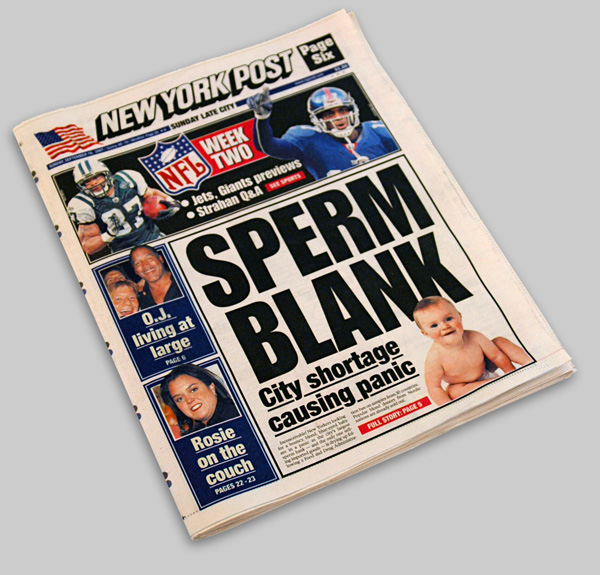
By Janon Fisher
Inconceivable!
New Yorkers looking for a bouncy, blue-eyed baby are in a panic as the city's largest sperm bank - and the only one with imported goods - is running dry.
Cryos International, based in the Financial District, has gone to seed because the Food and Drug Administration banned sperm samples from 30 countries to prevent the spread of Creutzfeldt-Jakob disease, a rare, fatal disorder caused by eating beef contaminated with mad-cow disease.
Two years after the measure, Cryos has run out of offerings from such prized blond Norsemen as "Oluf," "Dagh," "Finn," "Ingi, "Jorn" and "Ante."
If matters aren't resolved soon, say goodbye to "Jarls," "Sven," "Gorm" and "Leif," as well.
One Upper West Side couple, who has a daughter by the Danish donor "Dane" and is looking to have another, was shocked by the ban.
The parents, both 41, purchased Dane's donation before it ran out. They have enough left to try another artificial insemination, but if that doesn't work they won't be able to give their 8-month-old daughter a full sibling. "It's really stunning because I did want the same father for my daughter," said the mother, whose husband was left sterile by a childhood disease.
The couple chose Cryos because they wanted a child who resembled them.
"Dare we hope that here is some sort of magical Scandinavian sperm bank? We looked on the Internet and found out abut this clinic," she said.
Sperm bank manager Claus Rodgaard said most of the Northern European donor supplies will be gone by next year. "We have a waiting list of 15 to 20 couples," he said.
Couples who once hoped to purchase samples from square-jawed, strapping Norsemen living in Lillehammer will have to settle for locksmiths, bartenders and struggling writers from less exotic locales, such as Bensonhurst, Rego Park, Queens, and Hackensack, N.J.
Clinics that get their donations from locals are not affected by the guidelines. But Americans are barred from donating if they have lived in the U.K. for more than three months between 1986 and 1996, or in Europe for more than five years since 1980.
Cryos - which sells about 1,000 samples per month for between $175 and $300 each - is now scrambling to fill its freezer with the seed of local guys who get paid $75 per sample. The most prolific donors supply samples twice a week.
"Our problem is that we can't get enough sperm," Rodgaard said. "And the quality of sperm is not getting any better. Seventy-five percent of the donors are turned down."
There are only six sperm banks in New York City.
The bank puts samples through a battery of tests that screen for HIV, sexually transmitted diseases, hepatitis B and C, and other disorders.
Couples looking for a donor further narrow the pool of donors with their own preferences. "Guys with red hair don't sell well in Denmark," he said. "I'm sure that if we have a donor that is 8 feet tall, that might not be that popular."
Still, the mad-cow precaution is unnecessary, according to one scientific study, which says the risk of getting the human form of the disease from sperm is the same as getting killed by lightning.
Couples seeking imported sperm should be educated rather than being left childless because "of what is clearly a negligible risk of contracting" Creutzfeldt-Jakob, Dr. David Mortimer writes in an article in the October 2006 issue of Reproductive BioMedicine.
The FDA did not comment on the study, but cited the conclusions of a 2001 committee finding the mad cow could be passed through sperm.
"I'd rather take the chance and end up with another perfect child," the Manhattan mother said.